With so many experts on climate change here at Imperial, many people ask us what they personally can do about it? And how does this fit into the bigger picture?
We spoke to our scientists at the Grantham Institute and drew up a list of the most achievable ways you personally can make a difference. While individuals alone may not be able to make drastic emissions cuts that limit climate change to acceptable levels, personal action is essential to raise the importance of issues to policymakers and businesses.
Using your voice as a consumer, a customer, a member of the electorate and an active citizen, will lead to changes on a much grander scale.
“Use your voice, use your vote, use your choice”
Al Gore
1. Make your voice heard by those in power
Tell your Member of Parliament, local councillors and city mayors that you think action on climate change is important.
A prosperous future for the United Kingdom depends on their decisions about the environment, green spaces, roads, cycling infrastructure, waste and recycling, air quality and energy efficient homes.
Contact Us
Ultimately, steps to reduce carbon emissions will have a positive impact on other local issues, like improving air quality and public health, creating jobs and reducing inequality.
What can I do?
Find out who your MP is, and the best way to contact them.
This briefing paper and animation highlight the co-benefits of climate action, and why it is particularly relevant for decision-makers in cities and devolved regions. Share it with your local MP.
Join a social movement or campaign that focuses on environmental activities or gets everyone talking about climate change action, such as the Youth Strike 4 Climate or Extinction Rebellion.
An animation of a future city
There are many benefits to taking action on climate change, such as improved health, growth in the low-carbon jobs market, and reduced inequality.
2. Eat less meat and dairy
Avoiding meat and dairy products is one of the biggest ways to reduce your environmental impact on the planet. Studies suggest that a high-fibre, plant-based diet is also better for your health – so it can be a win-win.
Eat fewer or smaller portions of meat, especially red meat, which has the largest environmental impact, and reduce dairy products or switch them for non-dairy alternatives .
Try to choose fresh, seasonal produce that is grown locally to help reduce the carbon emissions from transportation, preservation and prolonged refrigeration.
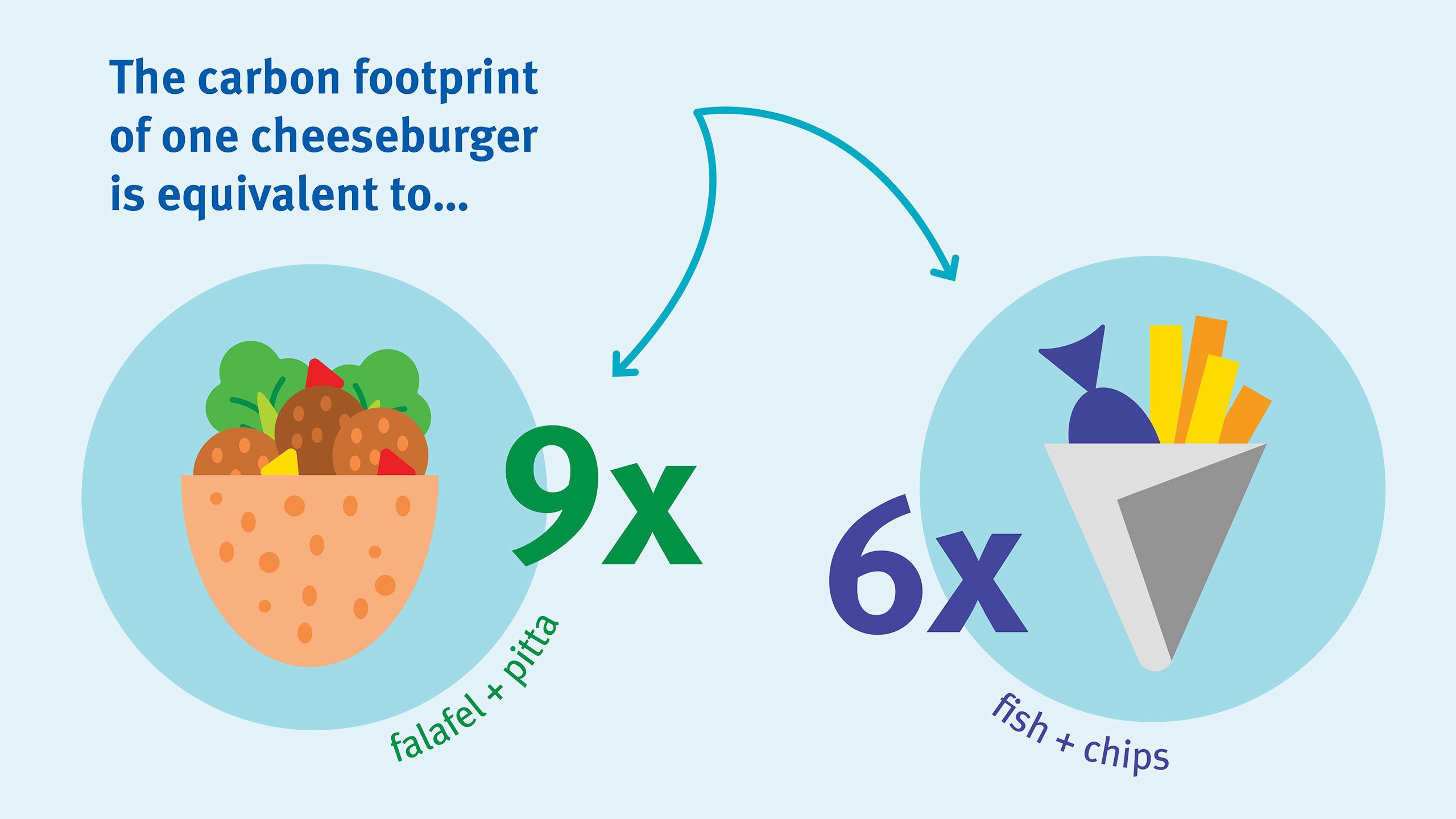
Find out more
Check out our blog on going vegan for top tips on making it a success.
And have you thought about eating insects? They are a healthy and environmentally friendly food source, so why don’t we eat them? Researchers at Imperial have been investigating how people in the Western world can be convinced to eat them.
For more details on how eating a more plant-based, seasonal diet can help tackle climate change, support the local economy and help us to live healthier lives, check out our blog: Saving the planet, one meal at a time.
3. Cut back on flying
If you need to fly for work, consider using video-conferencing instead. For trips in the same country or continent, take the train or explore options using an electric car.
When flying is unavoidable, pay a little extra for carbon offsetting.
For leisure trips, choose nearby destinations, and fly economy – on average, a passenger in business class has a carbon footprint three times higher than someone in economy.
Find out more
Read more about why flying shouldn’t necessarily be the default option for international travel, and how businesses can lead the way in reducing the demand for air travel.
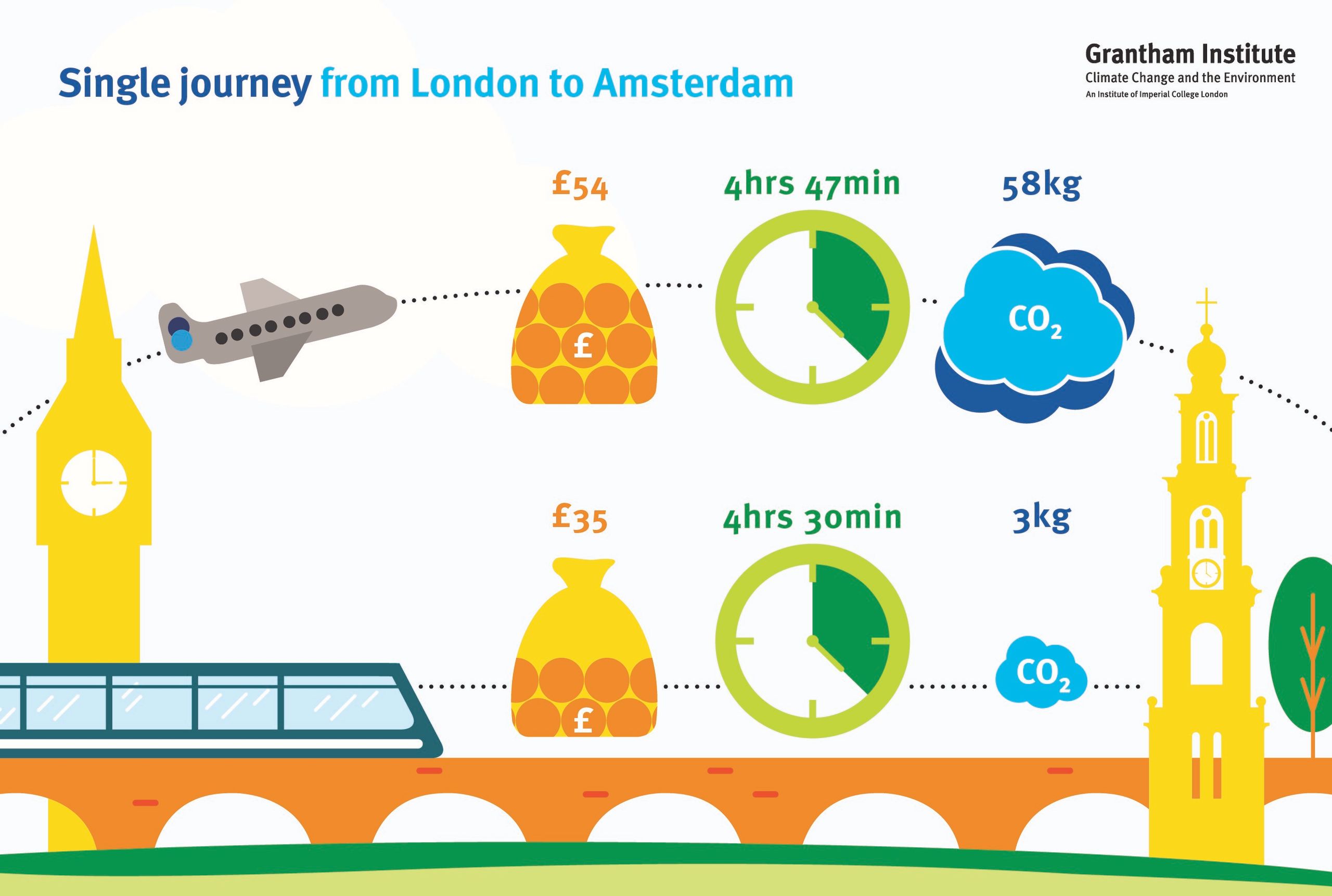
How do the cost, time and carbon emissions of a single journey from London to Amsterdam by plane, compare to travelling by train? (Assumptions: the start and end location are the main train terminal in the centre of each city; travel costs are for the cheapest advance tickets bought in advance and include all connecting journeys; carbon emissions are calculated using UK government greenhouse gas emissions factors for short-haul flights, ferry and international rail travel.)
There are a variety of reputable carbon offsetting schemes that fund sustainable development projects or natural solutions like planting trees.
Myclimate also compares the carbon emissions of your particular flight, with the maximum amount of carbon dioxide a person should produce per year in order to halt climate change, and the average amount an EU citizen produces each year. It makes for sobering reading.
Did you know?
Transport has become the largest emitting sector of the UK economy, accounting for 28% of UK greenhouse gas emissions in 2017.
4. Leave the car at home
Instead of getting in the car, walk or cycle – and enjoy the physical and mental health benefits, and the money saved. For longer journeys, use public transport, or try car sharing schemes.
Not only do cars contribute to greenhouse gas emissions, but air pollution caused by exhaust fumes from traffic poses a serious threat to public health. It has been shown to affect the health of unborn babies and increase the risk of dementia.
Furthermore, Imperial research shows that poor air quality in the capital leads to around 1,000 London hospital admissions for asthma and serious lung conditions every year, and that air pollution in the United States is associated with 30,000 deaths and reduced life expectancy.
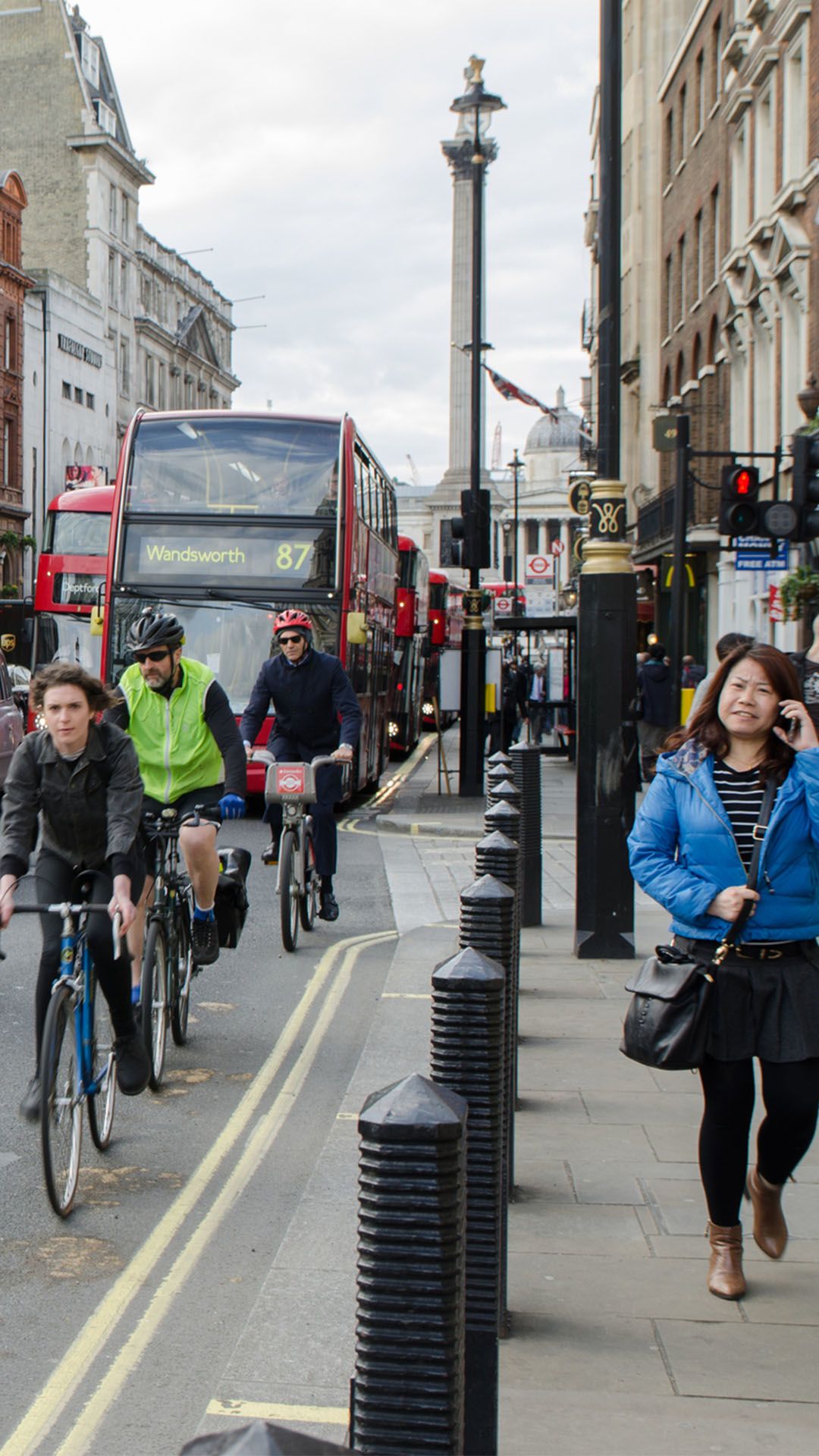
If driving is unavoidable…
Investigate trading in your diesel or petrol car for an electric or hybrid model. Alternatively, if you only need one for a short time, there are some all-electric car hire companies.
When behind the wheel, think about the way you drive:
Switch off the engine when you park up.
Make sure the tyres are fully pumped, and that the oxygen sensors are in good order – this can improve the cars fuel mileage and efficiency by up to 3% and 40% respectively.
Drive smoothly.
5. Reduce your energy use, and bills
Small changes to your behaviour at home will help you use less energy, cutting your carbon footprint and your energy bills:
Put on an extra layer and turn down the heating a degree or two.
Turn off lights and appliances when you don’t need them.
Replace light bulbs with LEDs or other low-energy lights.
Make simple changes to how you use hot water, like buying a water-efficient shower head.
Go further
Make sure your home is energy efficient. Check the building has proper insulation, and consider draught-proofing windows and doors. If you are in rented accommodation, lobby your landlord to make sure the property is energy efficient.
Switching energy supply to a green tariff is a great way to invest in renewable energy sources – and could save you money on bills too.
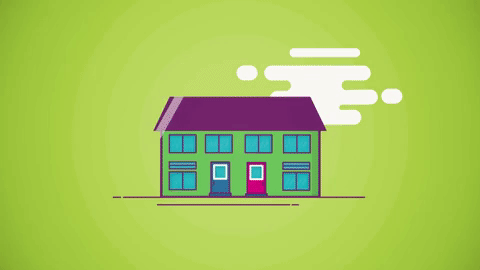
Double glazing, insulation and low-energy lights are all good ways to increase the energy efficiency of your home.
6. Respect and protect green spaces
Green spaces, such as parks and gardens, are important. They absorb carbon dioxide and are associated with lower levels of air pollution.
Additionally, they help to regulate temperature by cooling overheated urban areas, can reduce flood risk by absorbing surface rainwater and can provide important habitats for a wide variety of insects, animals, birds and amphibians.
Also, they also provide multiple benefits to public health, with studies linking green space to reduced levels of stress.
What can I do?
Plant trees. The Woodland Trust are aiming to plant 64 million trees over the next 10 years – and need your help. Whether you want to plant a single tree in your garden, or a whole wood, they have tools and resources to help.
Create your own green space. Add pot plants to your window sill or balcony, and if you have your own outdoor space, don’t replace the grass with paving or artificial turf.
Help to protect and conserve green spaces like local parks, ponds or community gardens. Organisations like Fields In Trust and the National Federation of Parks and Green Spaces have advice and resources on how you can get involved in areas local to you.
Check out TCV. If you don’t have direct access to open spaces, this community volunteering charity brings people together to connect to nature. In addition, create healthier and happier communities.
7. Invest your money responsibly
Find out where your money goes. Voice your concerns about responsible investment by writing to your bank or pension provider, and ask if you can opt out of funds investing in fossil fuels.
There are also a number of ‘ethical banks’ you can investigate.
Find out more
Banks, pensions funds and big corporates often hold investments in fossil fuel companies. However, there is a discussion around responsible investment. For instance, weighing up environmental, social and governance (ESG) factors and taking them into consideration when investing money – is growing.
8. Cut consumption – and waste
Everything we use as consumers has a carbon footprint.
Avoid single-use items and fast fashion, and try not to buy more than you need.
Shop around for second-hand or quality items that last a long time.
Put your purchasing power to good use by choosing brands that align with your new green aspirations.
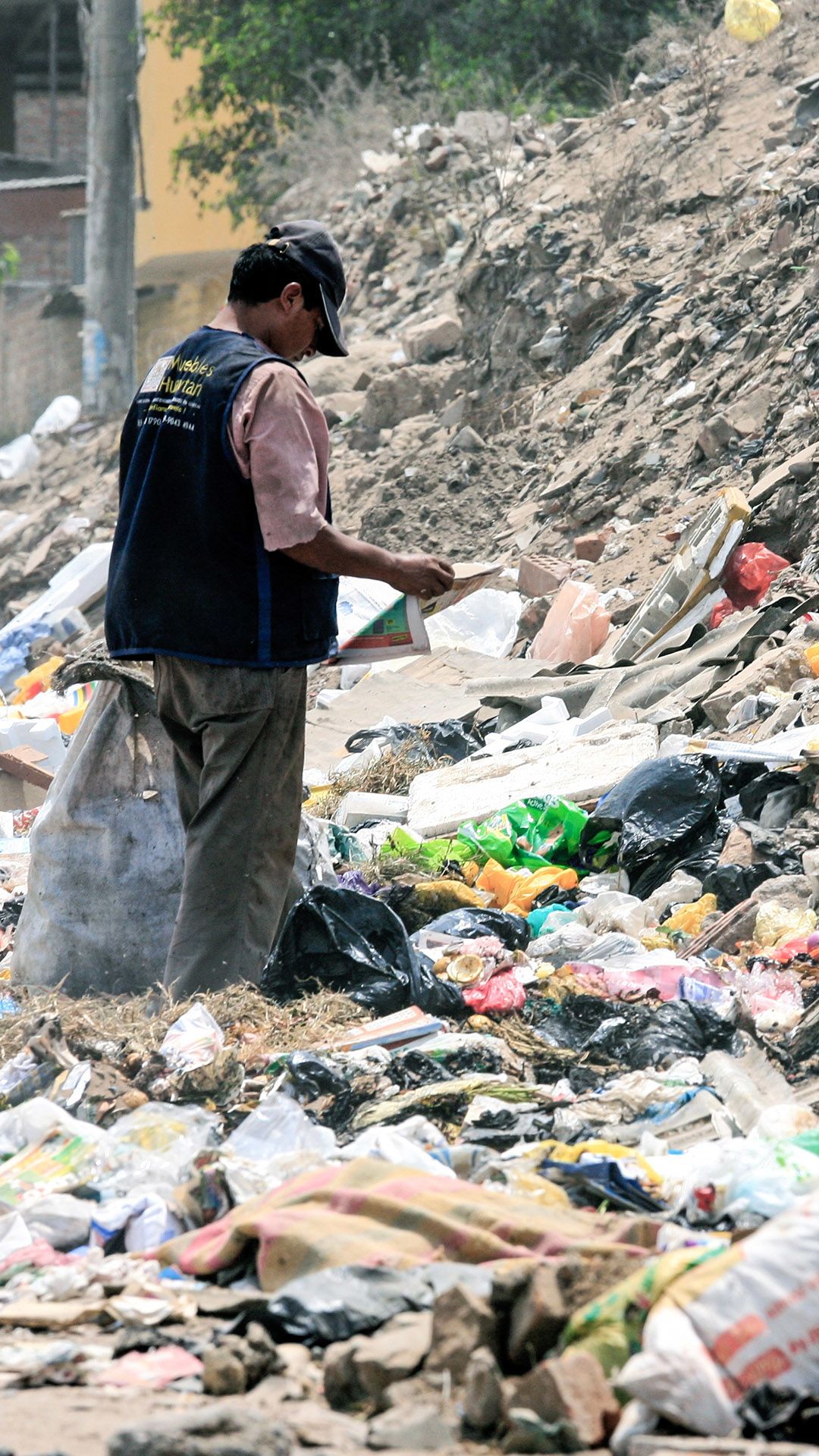
Try to minimise waste
Repair and reuse.
Give unwanted items a new life by donating them to charity or selling them on.
Avoid wasting food.
Let brands know if you think they are using too much packaging – some will take customer feedback seriously.
9. Talk about the changes you make
Conversations are a great way to spread big ideas.
As you make these positive changes to reduce your environmental impact, share your experience with your family, friends, customers and clients. Don’t be a bore or confrontational. Instead, talk positively, and be honest about the ups and downs.

